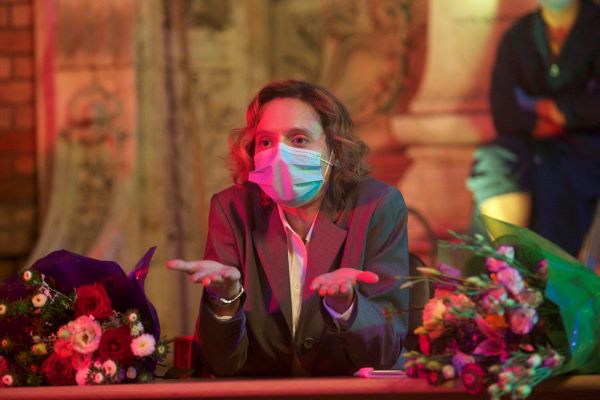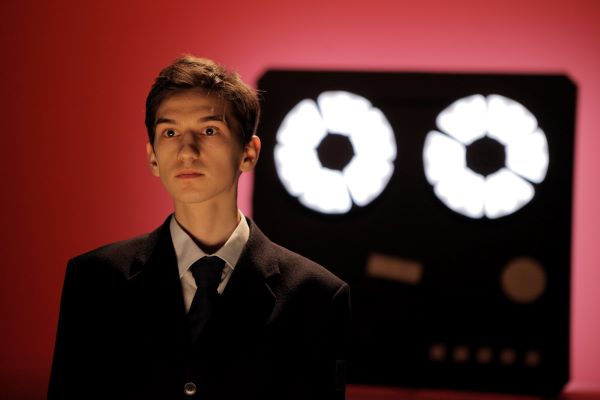![]() If his native country is paying any attention to Romanian filmmaker and provocateur Radu Jude, it must need ointment for painful blisters. The idiosyncratic director blasted Romania’s history of serfdom with the cruelly matter-of-fact period piece Aferim! (2015). His I Do Not Care If We Go Down in History as Barbarians (2018) ripped the lid off Holocaust denial within the framework of a woman director’s staging of an unruly battle reenactment. Now come two more Jude films torching Romanian ignorance, authoritarianism, and poltroonery. The borderline-bonkers Bad Luck Banging or Loony Porn (2021) churns with incendiary ideas, while Uppercase Print (2020) condemns Ceausescu–era repression with clunky sincerity. The two films use kitsch archival footage both to mock the past and evoke a peculiar nostalgia for it; both movies pitilessly trace Romania’s folly, from the self-regarding lies of dictatorship to the pretensions of today.
If his native country is paying any attention to Romanian filmmaker and provocateur Radu Jude, it must need ointment for painful blisters. The idiosyncratic director blasted Romania’s history of serfdom with the cruelly matter-of-fact period piece Aferim! (2015). His I Do Not Care If We Go Down in History as Barbarians (2018) ripped the lid off Holocaust denial within the framework of a woman director’s staging of an unruly battle reenactment. Now come two more Jude films torching Romanian ignorance, authoritarianism, and poltroonery. The borderline-bonkers Bad Luck Banging or Loony Porn (2021) churns with incendiary ideas, while Uppercase Print (2020) condemns Ceausescu–era repression with clunky sincerity. The two films use kitsch archival footage both to mock the past and evoke a peculiar nostalgia for it; both movies pitilessly trace Romania’s folly, from the self-regarding lies of dictatorship to the pretensions of today.
Bad Luck Banging is separated in three parts by pink title cards inscribed with coy sayings over chanted French ditties. The first part kicks off with an explicit home video of vigorous, clearly enjoyable but embarrassing NSFW middle-aged married sex, sex that will tarnish Emi (Katia Pascariu), the female half of the couple and a talented history teacher at a secondary school. The video has been uploaded to the internet (in a typically Romanian evasion, no one admits by whom, although suspicions point to the husband), and now Emi faces censure from her school and the possible loss of her job.
The second part follows Emi’s long, strange walk to the meeting where her fate will be decided. The soberly dressed figure makes her way through shabby Bucharest, a chaotic city of crumbling palazzos and abandoned movie theaters where gaudy billboards and cafés with frou-frou names falsely promise out-of-reach Western luxuries. Along the way she enters a dumpy apartment and confronts what feels like an army of ill-tempered, foul-mouthed eccentrics. Emi’s journey unfolds as a twisted modern fairy-tale, offering a taste of the ordeal to come.
In an act of further foreshadowing, Jude interrupts the story with a surreal medley of old military newsreels, Cold War–period propaganda, and scenes of Nazi collaboration, among grotesque modern tableaux that include racist attacks and environmental despoliation. Some of the points made may be facile; others sting. Romania is a hairball of evil and denial, the montage seems to say, and our instincts are confirmed in the movie’s third chapter as Emi takes the stand at the makeshift tribunal that will determine whether she can keep her job.
Emi faces her Covid-masked accusers in a garden and stands up for herself nobly and logically, even when her sex tape is played in public. (Her eyes die a thousand deaths above her mask as an old man priggishly says “This is disgusting, but we must watch it till the very end.”) But the discussion fast degenerates into a free-for-all of wild accusations, sexist shaming, Trumpian coarseness, pseudo-intellectual posing, and slanders against the Roma and Jews. How can Emi respond to a man who declares that Hitler was a Jew who created Israel under false pretenses?
In her defense, Emi recites a pornographic poem by Romanian national poet Mihai Eminescu, a crowning moment of absurdity in a movie where they flare up at every turn. The film ends with three scenarios playing out different versions of how Emi’s case may end up. Suffice it to say that the last version is comically deranged and over-the-top. Bad Luck Banging traffics in the surreal, but its spectacle of a smart, committed person brought down by a mob rings uncomfortably real. This movie, roiling with antic thoughts, may leave you bewildered, guiltily amused, and intellectually turned-on by what you’ve just seen.
Some critics have tried to universalize or even Americanize Bad Luck Banging, using its scenes of misinformation and thuggish behavior to draw parallels to the U.S.’s current fractious state. I’d counter that it depicts a very Romanian reality. Uppercase Print goes even deeper into Romania’s totalitarian past with an account of rebellion based on a true story. After the pyrotechnic inspiration of Bad Luck Banging, Uppercase comes off as a bit of a letdown, playing into old stereotypes of Eastern European drama as talky and static. Still, Jude manages to throw in enough odd touches to keep viewers attentive, and the film benefits from a certain rugged simplicity.
The director has adapted a 2013 stage play by Gianina Carbunariu and films it adorned with sets reenacting blocky Communist designs of squared-off buildings and crude surveillance devices. It’s set in 1981 in the provincial town of Botosani, and Romania’s feared secret police have spotted graffiti reading “WE WANT FREEDOM” on a wall. More subversive writing follows, with special attention given to the formation of the letters. Local tattletales weigh in and the cops plan a crackdown, with orders to “watch all citizens in the town and on the outskirts.” When the culprit is revealed as a teenage boy, Mugur Calinescu (Serban Lazarovici), the full force of the state and its vengeful toadies is harnessed to make an example of him and ruin his life.
Into this heavy scenario Jude again throws archival footage, intercutting it with stern scenes of the boy defying authority. These clips are often fun and sometimes impossibly campy, featuring cheesy Gheorghe Zamfir music and shambolic commie parades. They again reinforce the idea of Romania as a coercive society of busybodies and scolds, in thrall to the West and yet suspicious of it. The clips can combine uneasily, however, with the staged play portion, which sometimes feels rigid as the characterization of its leading young man. Additionally, most of the play’s actors talk directly to the screen.
The idealistic teenager functions as a paragon of righteousness, showing no trace of fear or insecurity as he hectors his parents about freedom like Antigone (or Dudley Do-Right). Only when they reveal their fear and consternation—the mother blames herself for the boy’s predicament, the father blames her and unnamed foreign influences—does the play open up emotionally beyond a tale of a censorious regime chasing a noble freedom fighter. Dialogues also take place, mercifully providing a switch from the actors talking to the camera.
For a moral story, Uppercase Print has an ambiguous end. What really happened to Mugur Calinescu? The secret police try to justify the subjugation of citizens over shots of tacky modern-day Romania, implying that the country is haunted through the ages by wrongdoing and coverups. By now we’ve already surmised that. Exposing wrongdoing and cover-ups is part of Jude’s mission, and he does it more imaginatively and excitingly elsewhere than here.


















Leave A Comment